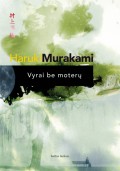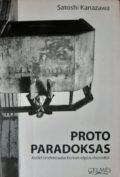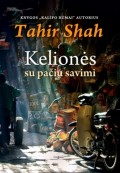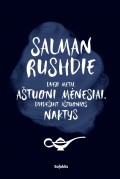 Authors:
Authors:
Kiew Kit, Wong
Translated by:
Kuzas, Rimvydas
Translated from:
English
Published on:
2015
“Qigun” – it is Wong Kiew Kit book about vital energy, how to improve health, develop internal power and train your mind. Energy in Chinese language is called chi. Chi – is energy, which allows us to walk, to speak, to work, to imagine and a lot of other actions. Of course, we get chi from air or food, not only from cigun practice, but with practice we can get more energy. Cigun is experimental, not only intellectual discipline. It is not enough to read and understand what is cigun, but if … More
 Authors:
Authors:
Murakami, Haruki
Translated by:
Čepulionytė, Gabija
Translated from:
Japanese
Published on:
2015
Haruki Murakami is a japanese writer, born in 1949 on January 12th. He was raised in Kiyoto but currently lives in Tokyo. According to the majority H.Murakami is contraversial and has a Western outlook. In his homeland he is criticized for abandoning the typical style and some of the Western countries believe that he is being toady towards them. Disregarding that, no one can deny that Haruki Murakami is one of the greatest writers that are still alive and his work is constanly in the bestseller list. One of his most recent books “Men without women” is a six-story collection which is about men that are parted from or left by their women. Protagonists suffer from loss in every single novelle. More
 Authors:
Authors:
Higashida, Naoki
Translated by:
Naujokaitytė, Eglė
Translated from:
English
Published on:
2015
Naoki Higashida- a thirteen year old boy with autism, the author of this book.
This book reminds more of an interview than an actual book you would pick up to read. Written in a very interesting style Naoki Higashida helps an average human to understand autism and life with it. It is a great way to get to know more about this development disorder not only for the parents of autistic children but also to everyone who is not familiar or well versed at the subject. In this modern world psychological disorders are often stigmatized and not talked about in the positive light. Therefore, it creates a lot of stereotypes and myths about people who have it. This book helps to educate yourself on the topic of autism and fight those created stereotypes. The young author, even though, he cannot communicate using words or writing, has created a way to connect with people and show that autism does not stop you from socializing. It is very interesting to read a book from such a young author and see the way he sees the world, people and how he experiences everyday things. More
 Authors:
Authors:
Kanazawa, Satoshi
Translated by:
Norkūnienė, Nida
Translated from:
English
Published on:
2015
This popular psychology book helps to understand the definition of intellect and its meaning in bigger cultural context and helps to distinguish intellect from self-value. According to the book’s author Satoshi Kanazawa it is not correct to put individual’s self-value and efficiency with his work results and author proves it with scientific researches and easily understandable examples from every day life. That is why this book is easily understandable to people who might not be very familiar with psychology or science. However, it is a good piece to read if you want to learn more and get to know interesting facts about intellect and how brain works. More
 Authors:
Authors:
Shah, Tahir
Translated by:
Drazdauskaitė, Rasa
Translated from:
English
Published on:
2015
“Travels With Myself“ – the book, which contains the most wonderful and colorful travel stories, written over almost twenty years: impressions from Asia, Africa, Latin America and many other parts of the world, jungle, desert, small towns and mega-cities. Stories in this book are like stones collected on the beach. They are various forms, placed in random order and written in different style, brought back from all over the world.
More
 Authors:
Authors:
Ishihara, Yumi
Translated by:
Palmira, Martinkienė
Translated from:
Russian
Published on:
2015
“Oriental way to recovery” – is a book, the title of which we can understand that there will be talking about the Eastern way of life. But the Journal mostly highlights medicine – the use of drugs, diet, various exercises, even the oriental philosophy. All of this author defines as “a way to live.” The question remains: „why is it oriental?“. Ishihara Yumi’s book attempts to reveal the differences between oriental medicine from the West, what people can change in order to achieve such More
 Authors:
Authors:
Okakura, Kakuzō
Translated by:
Juras, Tadas
Translated from:
English
Published on:
2015
Kakuzō Okakura(February 14, 1862 – September 2, 1913) was a Japanese-born art historian and critic, most widely known for his great contributions in solidifying Japanese art and history in the Western society. In his long essay “The Book of Tea” he writes about the ritual of drinking tea as well as the Japanese tea ceremony, its’ history, development and influence in both Western and Eastern worlds. In the book he also coins the term “Teaism”- a sort of philosophy of tea, which is … More
 Authors:
Authors:
T. Kiyosaki, Robert T.
Translated by:
Stokys, Ovidijus
Translated from:
English
Published on:
2015
Robert. T. Kiyosaki in his book “Rich Dad Poor Dad“ reveal the truth about how to become wealthy. The book starts with the story about his childhood, when he was only nine years old boy, since that was the time when he started to be interested in becoming rich. R.T. Kiyosaki‘s father (poor dad) had a different creed than author‘s friend‘s father (rich dad) did, for example, poor dad considered well known Robin Hood to be a hero, on the other hand, rich dad believed him to be a nothing More
 Authors:
Authors:
Yoshimoto, Banana
Translated by:
Baronina, Indrė
Translated from:
Japanese
Published on:
2015
Banana Yoshimoto (born 1964) is a Japanese author, best known for her debut novel “Kitchen”. Her writing often deals with young people striving to survive in the modern world and trying not to lose themselves after going through painful or even traumatic experiences. However, the dark subject material does not overshadow warm and somewhat joyful tone of Yoshimoto’s stories, a feature that gives quite an interesting atmosphere to her works.
More
 Authors:
Authors:
Rushdie, Salman
Translated by:
Žalytė-Steiblienė, Danguolė
Translated from:
English
Published on:
2015
The novel reveals about the era of oddities that started in the twelfth century. At the exiled philosopher Ibn Rushd’s doorstep appears jinn princess Dunia. She falls in love with the mortal philosopher and starts having his children, one after another. They all have a specific feature – they are born without earlobes. Many years pass since then. A crack appears in the universe during a storm in New York, letting in the destructive jinns that follow another twelfth century’s philosopher More
 Authors:
Kiew Kit, Wong
Authors:
Kiew Kit, Wong 
 Authors:
Murakami, Haruki
Authors:
Murakami, Haruki  Authors:
Higashida, Naoki
Authors:
Higashida, Naoki  Authors:
Kanazawa, Satoshi
Authors:
Kanazawa, Satoshi  Authors:
Shah, Tahir
Authors:
Shah, Tahir  Authors:
Ishihara, Yumi
Authors:
Ishihara, Yumi  Authors:
Okakura, Kakuzō
Authors:
Okakura, Kakuzō  Authors:
T. Kiyosaki, Robert T.
Authors:
T. Kiyosaki, Robert T.  Authors:
Yoshimoto, Banana
Authors:
Yoshimoto, Banana  Authors:
Rushdie, Salman
Authors:
Rushdie, Salman